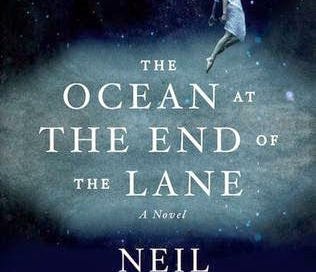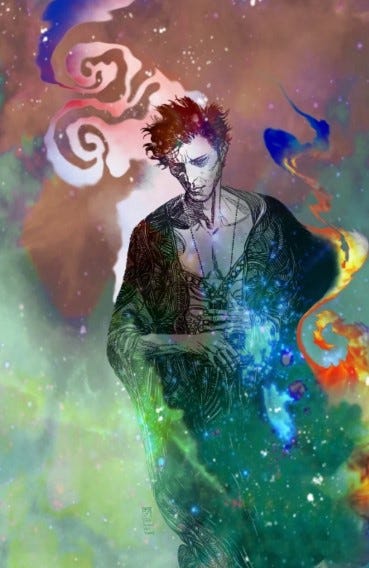I wrote this review of Neil Gaiman’s novel The Ocean at the End of the Lane a decade ago. To my mortification, a mutual friend retweeted it and copied Gaiman in; I would never have been so ill-mannered as to throw it in his face. As I recall he took it graciously on the chin — and why not, indeed, as he’d already sold over a million copies. Nowadays it’s fashionable to trash Gaiman — both the man and his creations, because no one any longer can separate the art from the artist. I have no way of judging the allegations against him, but that’s not the issue in any case. I still greatly esteem his comics but have seen nothing to change my opinion of his prose fiction. (The same applies even more strongly in the case of Alan Moore’s work, incidentally, but that’s a detail.)
There’s a line near the start of Sunset Boulevard. Nancy Olson dismisses William Holden’s screenplay with the words, “It’s from hunger.” This is something every writer recognizes: what you get when the Muse didn’t show up and you had to fabricate something to fill the blank page. The hunger doesn’t have to be for a rare steak or a new pair of shoes.
I often get this feeling from Neil Gaiman’s prose. The Muse he’s got chained up in his basement is the one for comics, not novels. The Sandman books would be the very first thing to go into my desert island trunk. His novels wouldn’t make it there even if I arranged for excess baggage.
This one, I thought would be different. An adult reminiscence of growing up in the 1960s in semi-rural England, feeding your imagination with Smash! comics and books of mythology, creating rituals to appease the monsters in the wardrobe, and recognizing that a numinous other world ran just below the skin of reality we can see. That’s right where I live, folks. The title The Ocean at the End of the Lane holds the same promise as the opening bars of “The Friends of Mr Cairo”: slough off that mundane skin and fantasy will fill your life.
I’m sure you can hear the “but”. I don’t want to give the impression there is nothing good about the book. Parts of it are excellent. The trouble is, with that title, you’re geared up to expect real wonder. I’ve been that seven-year-old kid and I can tell you something: it’s way more magical than this.
It starts promisingly, with death. The description of the opal miner’s arrival (running over a kitten) and later finding him gassed in the car, that’s all marvellous. But you can feel the moment that the author’s inspiration deflates and he allows his intellect to take over. We’re introduced to the Hempstocks, the family who live down the lane, and it is immediately obvious they are the triple goddess – the maiden, the woman and the crone – who will function as our Mary Sui Generis throughout. Where these three might have been mysterious and ambiguous (think what Alan Garner might have done with them) they instead pontificate in so desperate and on-the-nose a fashion that you begin to suspect Mr Gaiman thinks his readers might be a little on the remedial side.
Given a little more foreplay, the magic might yet have seduced us, but suddenly we’re thrust into a level of a videogame, gallivanting off on a inter-dimensional adventure on which the narrator is invited along for a throwaway reason that I don’t suppose the author even expects us to find credible. Please hang your disbelief at the door when you come in, it will help. A 10 hit dice monster is defeated, and pretty effortlessly at that, but in a way we can see is going to lead to trouble.
Back in the real world, the book starts firing on all cylinders again as the author starts cutting into a richer vein of inspiration. The narrator has to dig something out of his foot with a penknife (do little girls do that kind of thing?) but he doesn’t get all of it and now – like the Morrigan, like an evil Mary Poppins – the book’s villain shows up. Ursula Monkton, she calls herself, and my, she is breathtakingly nasty. She fucks the father, effectively replaces the mother in a Grimm transfiguration, enlists the sister as ally, and torments the narrator himself in a dozen petty, controlling ways. The dreadful high point of this part of the story has the father dunking his fully clothed son in an ice-cold bath while Ursula gloats from the doorway. His isolation is complete.
If it had gone on like that it would have been a masterpiece. Instead, one of those pesky nice goddesses waltzes in and deals with Ursula, snap, just like that. Did we ever doubt it? Not for a moment when young Miss Lettie Hempstock started spouting things like, “Ol’ varmints like you ent goin’ to take my friend.” Hokey and homey play well with the undemanding crowd who lap up this kind of fantasy.
In an interview at the back of the book, Mr Gaiman reveals that he wrote the book without planning. It began as a short story and just grow’d. And Alexander’s feet were carried clear of the ground by minions who thought he was a god, but authors who attain the same peak of all-conquering celebrity would do better to ignore those fawning editors and fans and remember that stories that are cobbled together on the fly are never going to be satisfying. (Unless, perhaps, the author is a genius. Outside of the medium of comics, Gaiman is not that.)
I kept thinking of two other books as I read this. Michael Frayn’s Spies is surely the antecedent for the novel’s voice, though Frayn carries off the older man retelling his childhood without the clangour of portentous faux-simplicity that keeps creeping into Mr Gaiman’s prose. And from the moment the narrator and the youngest yokel-goddess who befriends him set foot in the otherworld, I was put in mind of Robert Holdstock. But maybe you can only step once into Mythago Wood; in this case the terrain was more Dungeons and Dragons than rich, loamy awe.
I’m not sure why I find Mr Gaiman’s writing so brilliant and effective in comics and so jarring in prose. There is too much telling, too much coaxing. He backs away from darkness and wonder in favour of comfort and special effects. He will turn up the heat just as he would in a comic, but here he suddenly turns it down again. Is that because of an awareness that children might read the story? But children can be frightened witless without any lasting damage. Or is it simply because he was composing this story piecemeal, and sometimes the taps of the Hippocrene were flowing and sometimes not? I don’t know. It’s frustrating, because if this had been merely the first draft then something brilliant might have hatched from it. Instead we got a curate’s egg.
Back to the story. So now the author has dispensed with the antagonist who made it all personal and close to the family. But we’re only three-quarters of the way through the book. Whoops. Planning might have solved that, or even a rewrite, but this is all being improvised. Sometimes that can give you a direct channel to the unconscious and the goddess will sing (though hopefully not like a Sussex farm girl) but at other times your conscious mind just has to whip out the Meccano and build the best tracks it can in the time available.
In this case, delectably horrid Ursula is replaced by the game’s next boss: a bunch of other-planar vultures borrowed from Moorcock. As these critters are impersonal – they want to eat the narrator, but it’s just business – the story is losing altitude so fast by now that you begin to wonder if the author has bailed out. You sense him willing you to agree that he’s ratcheted up the tension: “Don’t you see? An ED-209 is much more dangerous than Long John Silver.” Even if power level alone was enough to create an interesting adversary, with the Fates themselves just over the field we know there is no threat (something we had actually forgotten while Ursula was briefly on stage) but a last-ditch attempt to make us pretend we don’t know that is made by having the oldest and most powerful of the Fates curled up in Odinsleep, that doze ex machina that we know from Thor comics will last as long as it needs to last.
“We can’t stop ‘em,” gasps plucky little almost-omnipotent Lettie. “Only Granny could an’ she’s asleep for maybe a hunnerd years.” In your dreams, Lettie. To nobody’s surprise, Granny wakes up and deals with it all as neatly as the Cat in the Hat’s clean-up machine. Is there a cost? Well, sort of. Lettie dies. Only she doesn’t really die. She’ll be back, we’re assured. Give it a decade or four; a good kip will knit up her ravell’d sleeve. The only hope is that we don’t have to read about it.






"The same goes even more strongly in the case of Alan Moore’s work, incidentally, but that’s a detail."
Oh, Lord, yes. As I said on Goodreads about Jerusalem: "I gave up after 700 pages. Some great ideas, and very clever writing, but it's unreadable. James Joyce meets Promethea, with a slice of Enid Blyton and a dose of LSD." I should probably note that there were still over 500 pages left at that point.
All reviews are, of course, fair comment… but I could have done without the airy judgement on the significant number of people who actually enjoyed The Ocean At The End Of The Lane, one of Gaiman’s most popular novels and one adapted into a highly regarded and hugely successful play.